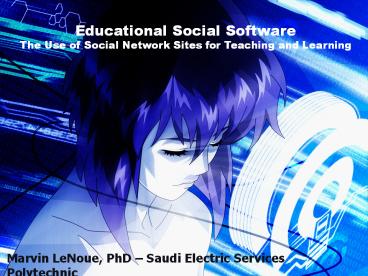Educational%20Social%20Software - PowerPoint PPT Presentation
Title:
Educational%20Social%20Software
Description:
The Use of Social Network Sites ... Multimodal presentation and communication ... the features of digital technologies are difficult to ... – PowerPoint PPT presentation
Number of Views:146
Avg rating:3.0/5.0
Title: Educational%20Social%20Software
1
Educational Social Software The Use of Social
Network Sites for Teaching and Learning
Marvin LeNoue, PhD Saudi Electric Services
Polytechnic
2
Educational Social Software
- Lambropoulos and Romero (2010)
- ESS is Web-based software supporting learning via
group interaction. - Under this paradigm we can consider a range of
applications such as Weblogs, wikis, social
bookmarking and syndication systems, multiplayer
online games, discussion forums, or even 3D
worlds.
Dave Cormier -- George Siemens Stephen Downes
-- Terry Anderson
ESS
3
Social Network Websites
Web-based services that allow individuals to 1)
Construct a public or semi-public profile within
a bounded system, 2) Articulate a list of other
users with whom they share a connection, 3) View
and traverse their list of connections and those
of others within the system. (boyd Ellison,
2007).
Hundreds of social network sites in active
operation worldwide. Most well-known in the
United States Facebook, MySpace, LinkedIn, Bebo
Unique aspect of social network sites Allow
users to make visible their social networks.
Effect is to make user connections available to
other users as potential connections. (boyd
Ellision, 2007 Greenhow Robelia, 2007).
4
Social Media Affordances
- Support for
- Connectivity, social rapport, community
- Support for conversational interactions
- Support for social feedback
- Collaborative information/content discovery
- Information/content sharing
- Knowledge and information aggregation
- Content creation and modification
- Multimodal presentation and communication
- Multiple learning styles
5
(No Transcript)
6
(Educational) Social Network Sites as Teaching
Tools
- A well-designed SNS offers course participants
- Multi-modal and multi-media communication and
content delivery capabilities. - Facilitation and stimulation of broad and dense
interaction patterns. - Collaborative information discovery and
processing. - Multiple-style learning opportunities.
A dedicated educational social network website
provides a virtual space where course
participants can meet and take part in various
formal and informal interactions centered on
shared learning objectives. This social space can
be a positive component of an online course.
Rena Palloff Keith Pratt The Virtual Student
7
Community
Learners in the online environment are able to
successfully build and maintain communities of
learning by engaging in many of the same
processes and behaviors associated with offline
communities. Online educators must look for
ways to promote community in the online context
and thereby gain its benefits for individual
members. (Haythornthwaite et al. 2004 Kazmer,
2004 Rheingold, 1993)
8
Transparency
The objective of educational social network site
use is increased awareness of the activities of
other individuals within the network. The SNS
functions to push work into a virtual shared
space. (Dalsgaard, 2008 Dalsgaard Paulsen,
2009)
9
Voorstel rondje
Presence
E-learning in the 21st Century D. Randy Garrison
Terry Anderson
10
(No Transcript)
11
(No Transcript)
12
(No Transcript)
13
(No Transcript)
14
(No Transcript)
15
Personal Learning Environment (PLE) The tools,
communities, and services that constitute the
individual educational platforms that learners
use to direct their own learning and pursue
educational goals. (Educause, 2009)
The PLE is a technological tool, but it is simply
a tool that allows us to do the sorts of things
that weve done since prehistory in order to
learn, in order to become a part of our
community. (Downes, 2010)
Knowledge in the typical learning management
system is usually static, declarative,
authority-based. Like books. Like a lecture.
(Downes, 2010)
Knowledge in the personal learning environment is
dynamic, tacit, not declared, not explicit,
created by people who are working inside the
personal learning environment. (Downes, 2010)
16
(No Transcript)
17
Social Network Sites in Education There But Not
There
One reason why some of the features of digital
technologies are difficult to implement in
educational practices is that they challenge the
traditions of teaching and learning on which
institutionalized learning has been based.
Through its impact on our culture and
communicative/ cognitive activities, technology
becomes significant to a rather radical
restructuring of how we develop skills and
exercise intelligent action (Saljo, 2010).
18
(No Transcript)
19
Our teaching and learning habits are useful but
they can also be deadly. They are useful when the
conditions in which they work are predictable and
stable. They are deadly if and when the bottom
falls out of the stable social world in and for
which we learn. According to Zigmunt Bauman
(2004), this is not merely a future possibility
it is the contemporary social reality.
Erica McWilliam Unlearning How to Teach
Innovations in Education and Teaching
International Volume 45, Issue 3, 2008 Special
Issue CREATIVITY OR CONFORMITY IN HIGHER
EDUCATION?
20
Every educational system is a political means of
maintaining or of modifying the appropriation of
discourse with the knowledge and the powers it
carries with it. Michel Foucault, The Discourse
on Language
21
"You take the blue pill, the story ends. You
wake up in your bed and believe whatever you want
to believe. You take the red pill, you stay in
wonderland, and I show you how deep the rabbit
hole goes." ?Morpheus to Neo
22
m_le-noue_at_sesp.edu.sa































